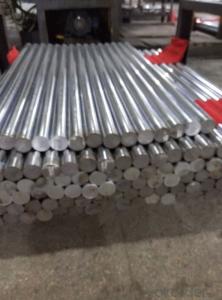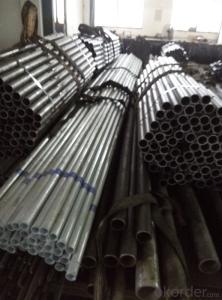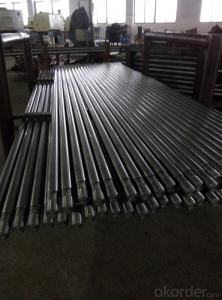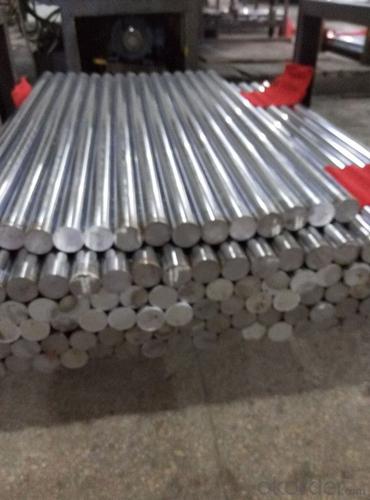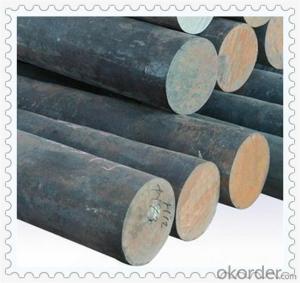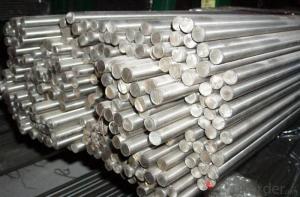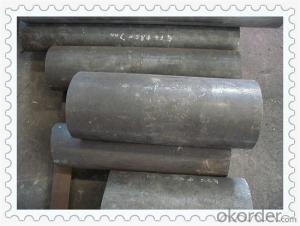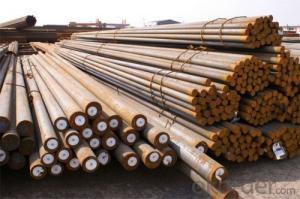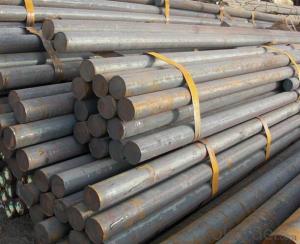Forged Steel AISI 4140 Alloy Steel Bars
- Loading Port:
- Tianjin
- Payment Terms:
- TT OR LC
- Min Order Qty:
- 25 m.t.
- Supply Capability:
- 500000 m.t./month
OKorder Service Pledge
OKorder Financial Service
You Might Also Like
Specification
Forged Steel AISI 4140 Alloy Steel Bars
Product Details:
1.Materail:Alloy Steel, Carbon Steel, Stainless Steel,etc
2.Length≤12m
3.OD≤Φ100~Φ1200
4.Ground and chrome plated
5.ISO9001:2008
6.competitive price
7.excellent service.
8.Strict quality control
9.Prompt delivery
Chemical Composition:
C | Si | Mn | Cr | Ni | Mo |
Equal or less than | |||||
0.37-0.45 | 0.17~0.37 | 0.90-1.20 | 0.90-1.20 | 0.20-0.30 | 0.20-0.30 |
Features:
1) Outer diameter: 15 - 80mm
2) Tube wall thickness: 1 - 8mm
3) Outer diameter: ± 0.01 mm
4) Inside diameter: ± 0.01mm
Delivery status: NBK(+N) BK(+C) BKW+(LC) BKS(SR)
Application:
AISI 4140 is a grade of steel an excellent material for such uses as gears, piston pins, crankshafts,and shafts.It is commonly used for a variety of applications in the oil and gas industry. Examples of applications for 4140 steel also include structural tubing,connection rods, stem assemblies, tool holders,tubes for transportation of pressurized gases.4140 Alloy Steel/SAE 4140 Steel Price is engineering steel supplied in quenched and tempered conditions. Very good machinability. High toughness. High creep strength. Repeated impact resistant capability.
Product Show:
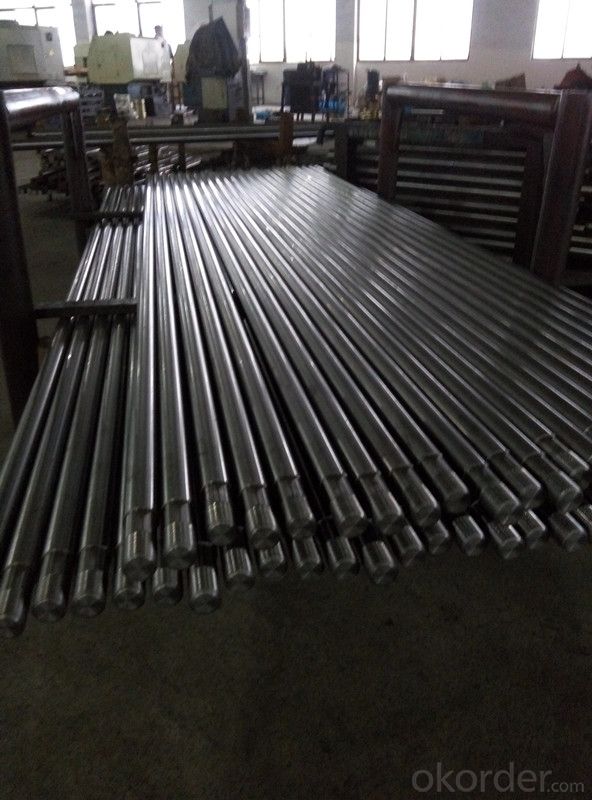
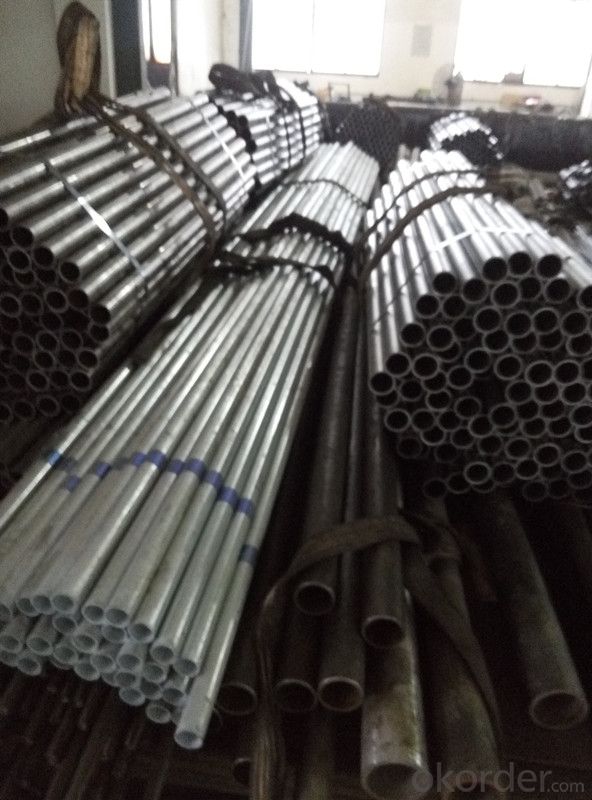
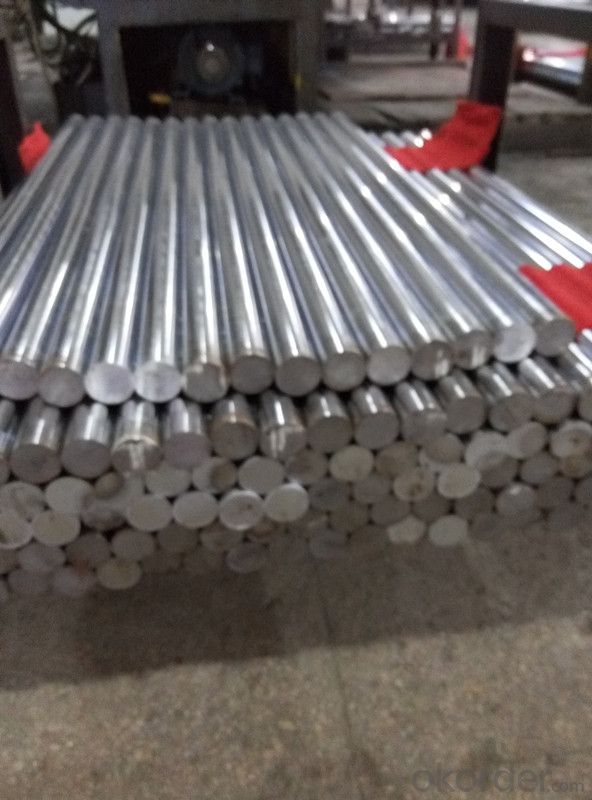
- Q: What are the different alloying elements used in special steel?
- There are several different alloying elements used in special steel, including chromium, nickel, molybdenum, vanadium, tungsten, cobalt, and manganese. These elements are added in varying amounts to enhance the steel's properties such as strength, corrosion resistance, hardness, and heat resistance.
- Q: How does special steel perform in high-pressure and high-temperature environments?
- Special steel performs exceptionally well in high-pressure and high-temperature environments due to its unique composition and properties. It exhibits excellent strength, toughness, and resistance to corrosion, making it ideal for withstanding extreme conditions. Additionally, special steel can maintain its mechanical properties, structural integrity, and dimensional stability even under intense heat and pressure, ensuring reliable performance and longevity in such environments.
- Q: What are the main characteristics of electrical steel forgings?
- The main characteristics of electrical steel forgings include high magnetic permeability, low core loss, and high electrical resistivity. These properties make electrical steel forgings ideal for applications in electrical transformers, motors, and generators, where efficient magnetic performance and minimal energy loss are crucial. Additionally, electrical steel forgings are known for their excellent mechanical strength, thermal stability, and resistance to corrosion, making them durable and reliable in demanding environments.
- Q: How does special steel perform in forging applications?
- Special steel is highly desirable for forging applications due to its exceptional strength, durability, and resistance to wear and tear. It offers superior performance as it can withstand the intense heat and pressure involved in the forging process without losing its shape or integrity. Additionally, special steel's unique composition allows for precise shaping and intricate designs, making it an ideal choice for complex forging projects.
- Q: What are the different types of special steel coatings?
- There are several different types of special steel coatings that are used to enhance the properties and performance of steel. Some of the most common types include: 1. Galvanized Coatings: This type of coating involves the application of a layer of zinc to the steel surface. Galvanized coatings provide excellent corrosion resistance, making them suitable for outdoor applications and structures exposed to harsh environments. 2. Epoxy Coatings: Epoxy coatings are known for their exceptional durability and chemical resistance. They are often used to protect steel from corrosion, abrasion, and chemical exposure. Epoxy coatings can be applied as single or multi-layer systems, enhancing the steel's lifespan and performance. 3. Powder Coatings: Powder coatings are a type of dry coating that is applied electrostatically and then cured under heat. They offer excellent protection against corrosion, impact, and UV damage. Powder coatings are available in a wide range of colors and finishes, making them a popular choice for aesthetic purposes as well. 4. Thermal Spray Coatings: These coatings involve the application of molten particles onto the steel surface using a thermal spray gun. The most common types of thermal spray coatings for steel are ceramic coatings, which provide enhanced wear resistance, thermal insulation, and corrosion protection. 5. PVD Coatings: Physical Vapor Deposition (PVD) coatings involve the deposition of thin layers of metallic or ceramic materials onto the steel surface through a vaporization process. PVD coatings provide improved hardness, wear resistance, and low friction properties to the steel. 6. Organic Coatings: Organic coatings, such as polyurethane or acrylic coatings, offer protection against corrosion, UV damage, and chemical exposure. These coatings are commonly used in architectural applications, automotive parts, and industrial equipment. 7. Chrome Plating: Chrome plating involves the deposition of a layer of chromium onto the steel surface. This coating provides excellent corrosion resistance, hardness, and a decorative finish. Chrome plating is often used in automotive applications and for decorative purposes. It is essential to select the appropriate type of special steel coating based on the specific requirements of the steel component or structure, including the level of corrosion resistance, durability, aesthetics, and environmental factors.
- Q: What are the advantages of using special steel?
- Special steel offers several advantages over regular steel. Firstly, it has superior strength and hardness, making it more durable and resistant to wear and tear. This makes it ideal for applications that require high strength and toughness, such as in the manufacturing of tools, machinery, and automotive parts. Additionally, special steel has excellent corrosion resistance, which helps prolong the lifespan of products exposed to harsh environments or corrosive substances. Moreover, it exhibits better heat resistance, allowing it to withstand high temperatures without losing its strength or shape, making it suitable for use in the aerospace and energy industries. Lastly, special steel can be customized to meet specific requirements, allowing manufacturers to create components with precise dimensions and properties, enhancing overall performance and efficiency.
- Q: How is high-speed tool steel used in the production of machining tools?
- High-speed tool steel is used in the production of machining tools due to its exceptional heat resistance, hardness, and wear resistance. It allows for the efficient machining of materials at high speeds, reducing production time and enhancing productivity. This steel is commonly utilized in the manufacturing of cutting tools, such as drills, milling cutters, and taps, to ensure precision and durability in machining operations.
- Q: What are the different methods for improving the corrosion resistance of special steel?
- There are multiple techniques available to enhance the corrosion resistance of special steel. 1. Alloying: Adding alloying elements, like chromium, nickel, and molybdenum, to the steel composition is a widely used method. These elements create a protective layer on the steel surface, preventing corrosion. For instance, stainless steel contains a substantial amount of chromium, which forms a passive film that shields the steel from corrosive surroundings. 2. Surface treatments: Diverse surface treatments can be applied to special steel to augment its corrosion resistance. These treatments include electroplating, hot-dip galvanizing, and chemical passivation. Electroplating involves coating the steel with a layer of zinc or nickel, serving as a sacrificial anode that safeguards the steel from corrosion. Hot-dip galvanizing entails immersing the steel in molten zinc to form a durable and corrosion-resistant layer. Chemical passivation involves treating the steel with a solution that eliminates surface impurities and forms a protective oxide layer. 3. Protective coatings: The application of protective coatings can considerably enhance the corrosion resistance of special steel. Coatings like paint, epoxy, or polyurethane act as barriers, preventing moisture and corrosive substances from contacting the steel surface. These coatings can be applied through spray, dip, or powder coating methods. 4. Heat treatment: Modifying the microstructure of special steel through heat treatment improves its corrosion resistance. Processes like annealing, quenching, and tempering can alter the steel's properties, making it more resistant to corrosion. Heat treatment can also alleviate internal stresses that contribute to corrosion. 5. Environmental control: Controlling the environment in which the special steel is utilized can also aid in improving its corrosion resistance. This includes maintaining appropriate humidity levels, controlling pH, avoiding exposure to corrosive chemicals, and implementing effective ventilation systems. By minimizing the exposure of special steel to corrosive elements, its corrosion resistance can be enhanced. In conclusion, a combination of these methods can be employed to enhance the corrosion resistance of special steel, ensuring its durability and performance in corrosive environments.
- Q: What are the different methods of surface powder coating for special steel?
- Special steel can be coated using various surface powder coating methods. These methods include: 1. Electrostatic powder coating: By charging the powder particles and spraying them onto the steel surface, a uniform and durable coating is achieved. The charged particles are attracted to the grounded steel. 2. Fluidized bed powder coating: Preheating the steel and dipping it into a fluidized bed of powder particles results in a smooth coating. The heat causes the powder to melt and adhere to the steel surface. Excess powder is removed through shaking or blowing air. 3. Flame spray powder coating: This method involves heating the powder particles with a flame and then spraying them onto the steel surface. The melted powder solidifies to form a coating. This method is commonly used for repairing damaged coatings or larger steel structures. 4. Thermal spray powder coating: By heating and propelling the powder particles onto the steel surface using a thermal spray gun, a dense and well-adhered coating is achieved. This method is suitable for high-wear applications and corrosive environments. 5. UV-cured powder coating: Applying a UV-sensitive powder onto the steel surface and exposing it to UV light initiates a chemical reaction that results in a hard coating. UV-cured powder coating is known for its fast curing time and excellent resistance to chemicals and UV radiation. Each method has its own advantages and considerations, and the choice depends on factors such as the specific requirements of the steel surface, desired coating thickness, and production volume.
- Q: How does special steel perform in terms of thermal expansion?
- Special steel typically has a lower coefficient of thermal expansion compared to other types of steel. This means that it expands and contracts less when subjected to temperature changes, resulting in better dimensional stability and reduced risk of warping or cracking.
Send your message to us
Forged Steel AISI 4140 Alloy Steel Bars
- Loading Port:
- Tianjin
- Payment Terms:
- TT OR LC
- Min Order Qty:
- 25 m.t.
- Supply Capability:
- 500000 m.t./month
OKorder Service Pledge
OKorder Financial Service
Similar products
Hot products
Hot Searches
Related keywords
